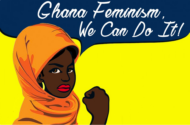
Statement Regarding the “Sex for Grades” Scandal
The statement is below:
We are African feminist scholars and feminist scholars of Africa, working in institutions both on and off the continent. All of us have direct or second-hand experience of, or are familiar with the kinds of sexual harassment which the BBC Africa Eye documentary: Sex for Grades exposed recently. Last year, a CNN cover story highlighted Sex for Grades violations in Nigeria. We are aware that sexual harassment in higher education institutions has eaten deep into the fabric of our society. Sexual harassment of students is tied to unequal power relations and the flagrant abuse of power predominantly by male faculty and staff of tertiary institutions and beyond, into the lower school levels where some teachers see this practice as part of the privileges enshrined in the education workspace. We find this to be unconscionable and a clear violation of the rights of girls and women to a safe and dignified pursuit of education.
We note that sexual harassment, sexual abuse, and sexual assault are so ingrained in campus cultures that the channels for reporting are ineffective. Some of us have dealt with cases of sexual harassment in our universities, as members of disciplinary committees. We have listened in amazement as male colleagues tried to protect predators. As feminists, we have been called all sorts of names. Some of us are also survivors of sexual harassment in the academy. We join our siblings in speaking out against and condemning the violence against women in these spaces that should offer a safe environment for learning and growth.
We applaud the young African women who put their safety at risk to conduct this investigation. These include Kiki Mordi and Monica Osagie who brought the issue to the limelight last year. We are glad to see and hear African stories told by African women. We recognise the need for support of women in order to recount their experiences of sexual intimidation and coercion in the face of gendered institutional hostility and the ensuing risks of victimisation and stigma. We note that the documentary has already prompted long-overdue action by authorities in Ghana and Nigeria, and we hope that the women who come after us can pursue their studies in safety, free of gendered harassment and abuse. We are happy that this public attention initiated by African women has amplified a much-needed conversation in our universities and other tertiary institutions. We stand with this generation of students to end sexual harassment in African universities.
Gendered sexual violence is not unique to African universities and we are careful to not reinforce victim-savage-savior narratives. While we often (justly) fear the consequences of publicly denouncing the treatment of Black women (cis or trans), when it’s at the hands of Black men, there is no way of even having an internal debate without the public gaze. In fact, the public gaze has been constantly used to silence many of us.
We note that Nigerian feminists have been working for decades to expose the multiple ways in which sexual harassment and sexual violence are embedded in university life. A sexual harassment prohibition bill introduced in 2016 failed to get through both houses of parliament in Nigeria, but is now back on the parliamentary docket as a result of the Sex for Grades documentary. However, we are also aware that a senate investigation which began last year on the same issue, yielded no fruitful result. We applaud the swift actions taken by churches such as the Foursquare Church, and institutions such as the University of Lagos and Ahmadu Bello University, Zaria to ensure that the members involved are summarily dismissed and their actions openly condemned.
We acknowledge the swift response by the National Accreditation Board of Ghana charging all educational institutions to institute sexual harassment policies, systems, structures and legislation that seek to protect students, especially female students and to implement the same or lose their accreditation. We further credit the Ghana Domestic Violence Coalition for its efforts towards leading discussions on the development of a national sexual harassment law in the country. The Centre for Gender Studies and Advocacy (CEGENSA) at the University of Ghana has had a sexual harassment policy since 2010, and adjudicated several cases, including some faculty and student dismissals.
We acknowledge pioneering work on sexual harassment across Southern Africa, led by Jane Bennett at the African Gender Institute, Amanda Gouws at Stellenbosch University, and others. In Nigerian universities, the Initiative for Women’s Studies in Nigeria, led by Charmaine Pereira, conducted extensive research on sexual harassment. In Uganda, Professor Sylvia Tamale led a 2016 investigation of sexual harassment at Makerere University which culminated into a comprehensive revision of the institution’s 2006 Anti-Sexual Harassment Policy. (See Appendix for links to these publications)